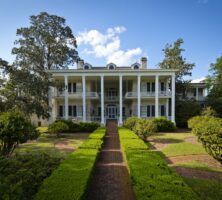Grady County, on the southwest border of Georgia, is the state’s 139th county.
Created in 1905 from 458 square miles of Decatur and Thomas counties, it was named after Henry W. Grady, prominent editor of the Atlanta Constitution and national spokesman for the “New South.” Located along Georgia’s border with Florida, Grady County is part of the “Plantation Trace Travel Region,” which includes several southwest Georgia counties.

Seminole Indians originally held the land now encompassed by Grady County. The first white settlers traveled from the Carolinas along Indian trails from the South Carolina line near Augusta, across the state to Macon, and down to the southwest. Among the settlers was William Hawthorne, a Baptist minister and explorer who arrived in the 1820s and settled his family about three miles south of present-day Cairo, on Tired Creek. Some of his friends in North Carolina followed him and settled farther south, around the present-day town of Calvary. Additionally a number of white Florida settlers moved to Georgia seeking safety when the Seminole Wars began.
The county seat, Cairo, was previously called Miller’s Station for a stagecoach stop named after a nearby settler, Henry Miller. In 1859 the Atlantic and Gulf Railroad began running through the settlement on its route from Screven to Thomasville, and in 1867 it established Railroad Station Number 20, called the Cairo Station after a nearby post office. Lots were sold to prospective townspeople beginning in 1866, and the town was incorporated in 1870. When Grady County was created, Cairo was designated the county seat. The police department currently occupies the old depot, built in 1905. The first courthouse, built in 1908, burned down in 1980; a new courthouse was soon built on the same spot.
Cairo and Whigham are the two incorporated cities in Grady County. Whigham, originally called Harrell’s Station, took its current name in 1880 for Robert Whigham, the owner of a large local mercantile store. Other communities in Grady County are Beachton, Calvary, Pine Park, and Reno. Calvary is home to an annual “Mule Day,” which swells the population of the town from less than 200 to 60,000 or more.

Before the Civil War (1861-65), settlers made their living in agriculture. The sandy loam of the area supported a variety of food crops, and land was cleared of pine forests to allow for farming. Until railroad transportation allowed them to market their goods, most inhabitants lived by subsistence farming. This started changing with Reconstruction, when sawmills were established, rail transportation became routine, and the county broadened its economic base to include forest products as well as market crops.
A satellite campus of Southwest Georgia Technical College (later Southern Regional Technical College) opened in Cairo in 2006.
Notable persons from the county include the writer Vereen Bell and baseball player Jackie Robinson.

Some points of interest in the county include the Birdsong Nature Center, a nonprofit nature preserve and education center created in 1986 from the former Birdsong Plantation, which was placed on the National Register of Historic Places in 1995; Cairo Commercial Historic District, also placed on the National Register of Historic Places in 1994; and Pebble Hill Plantation, a 7,000-acre estate owned in the 1930s by Kate Harvey of Cleveland, Ohio (niece of influential senator Marc Hanna of Ohio). Used by Harvey as a winter retreat, Pebble Hill was visited often by members and friends of the Franklin D. Roosevelt family and was home to a famous herd of Jersey cattle, the Pebble Hill Herd. Pebble Hill was added to the National Register in 1990.
According to the 2020 U.S. census, the population of Grady County is 26,236, an increase from the 2010 population of 25,011.











